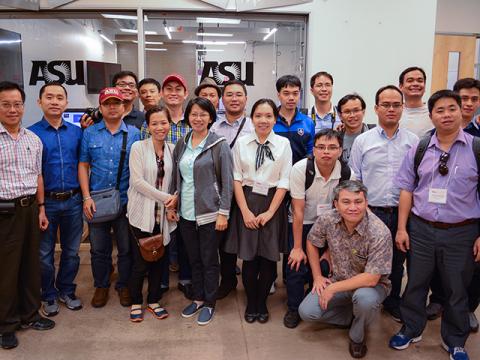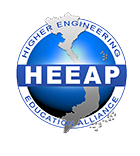The Arizona State University campus this fall welcomed 20 faculty members from the Vietnam National University-Ho Chi Minh City system, who came to campus to learn more about the emerging Internet of Things (IoT) field.
IoT is a proposed development of the Internet in which everyday objects have network connectivity, allowing them to send and receive data. IoT has the potential to transform many processes, including how cities manage their infrastructure and how high-tech companies manufacture their products. Ho Chi Minh City, in its quest to become a “smart city,” has a keen interest in both.
The Vietnamese instructors were the first “special topics” cohort to come to ASU under the Higher Engineering Education Alliance Program, or HEEAP. The program is run by ASU’s Ira A. Fulton Schools of Engineering.

A cohort of 20 instructors from the Vietnam National University-Ho Chi Minh City system visited Arizona State University in fall 2015 to learn more about the emerging field of Internet of Things. The Internet of Things is a development concept in which everyday objects have network connectivity and the ability to transfer and receive data. Photographer: Kevinn Tran/ASU
HEEAP was formed by Intel Corporation and ASU, and funded by the U.S. Agency of International Development, or USAID, to train Vietnamese professors from eight universities on more innovative ways to teach engineering. HEEAP launched in 2010 through founding partners Intel Corporation, ASU and USAID through a Global Development Alliance grant.
Intel, the world’s biggest chipmaker, opened a $1 billion factory in Ho Chi Minh City in 2010, providing opportunities for a growing high-tech workforce.
From 2010 to 2015, the program has trained more than 400 lecturers at ASU who, upon returning to Vietnam, are teaching and graduating work-ready students who possess the applied and technical communication skills required by multinational corporations.
“Intel identified IoT as a rapidly emerging field worldwide and approached us to deliver a workshop on how to create curricula for Vietnam,” said Jeffrey Goss, an assistant dean in the Fulton Schools and executive director of Global Outreach and Extended Education (GOEE), who directs the HEEAP Project. “The objective was to combine HEEAP’s teacher development program with IoT fundamentals to train faculty members from the Vietnam National University system.”
Upon returning to Vietnam, these “champions,” said Goss, will spearhead an IoT strategy at their respective departments to implement student-centered design projects in IoT, a certificate or minor with an IoT focus and IoT research projects. The goal is graduating Vietnamese engineers who are fluent in this emerging field.
“In the Internet of Things world we are able to more efficiently gather information from a manufacturing production line, fine tune our processes and optimize them to make them more efficient, lower cost and keep production running smoothly,” said Richard Tyo, industrial IoT solutions architect for Intel and a workshop instructor.
In programs like HEEAP, he said, industry and academia can work together to advance research and apply it in a real world setting.
“When we are implementing these new technologies, and transferring them to Vietnam to be operational, we need the people in Vietnam to be able to understand the technologies they are going to be working with,” Tyo said. “Educating the workforce is a very positive thing for Intel.”
The visiting faculty members were at ASU learning from HEEAP’s industry partners and ASU research faculty, including Intel executives and ASU faculty, on how to integrate different technologies (sensors, cloud computing, networks, etc.) to create a curriculum at their respective institutions that prepares their students for the emerging IoT field.
“The faculty explored different philosophies of teaching and learning, with a focus on active learning and student-centered teaching methods,” said David Benson, HEEAP academic director. “They participated, as students, in an engineering design project to reinforce problem-based learning. They were excited about learning new things that can be immediately brought into their classrooms to improve the engagement of their students.”
Participant Bui Hoai Thang, who is a faculty member of the computer science and engineering department at the Ho Chi Minh City University of Technology, said there were many things learned at the workshop that would help him improve the classroom experience when he returned home.
He said some of the challenges Vietnamese faculty face are lack of time to keep the curriculum updated and in line with industry needs, and a teaching and learning system that is “passive” in the sense that teachers lecture and students listen.
“Our students are good at thinking and learning, but they need to be more innovative and able to put theory into practice,” Thang said. “As teachers we need to be able to inspire them to design and analyze and improve process. We have to balance knowledge and practice, and teach more what industry needs.”
Goss also said a challenge faced by Vietnamese faculty is lack of access to tools and equipment to teach hands-on curricula to large classes.
To address this Intel and National Instruments have agreed to provide faculty with programmable development boards (free or at a discounted price for education) that support the collection, processing and transmission of data to build IoT devices. Intel, through their Higher Education Program, will donate hundreds of Galileo boards to be used in a variety of embedded computing applications to support curriculum innovation at the HEEAP schools.
Photo caption: A cohort of 20 instructors from the Vietnam National University-Ho Chi Minh City system visited Arizona State University in fall 2015 to learn more about the emerging field of Internet of Things. The Internet of Things is a development concept in which everyday objects have network connectivity and the ability to transfer and receive data. Photographer: Kevinn Tran/ASU

